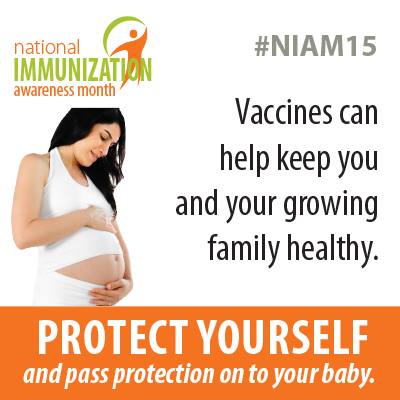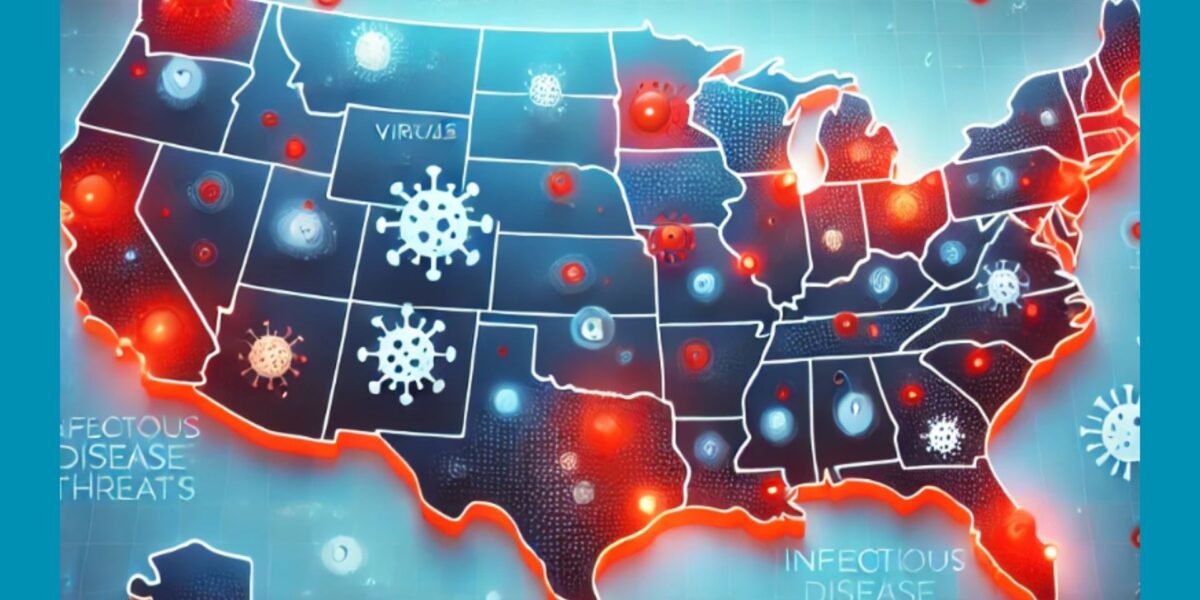
Every August, National Immunization Awareness Month (NIAM) provides an opportunity to highlight the importance of vaccines across the lifespan. As a partnering organization, the National Foundation for Infectious Diseases (NFID) is helping to promote the importance of immunization (including before, during, and after pregnancy) in keeping our communities healthy.
From the moment you found out you were pregnant, you began protecting your baby. You may have changed the way you eat, started taking a prenatal vitamin, and started to research which car seat to buy. But, did you know that one of the best ways to protect your children against pertussis (whooping cough) and influenza (flu) is to make sure you get the Tdap and flu vaccines while you are pregnant?
The vaccines you get during your pregnancy will provide your baby with some immunity that will last the first months of life. By getting vaccinated during pregnancy, your baby may also benefit from passive antibody transfer that will help protect against vaccine-preventable diseases. This early protection is critical for diseases like whooping cough and flu because infants in the first several months of life are at the greatest risk of severe illness from these diseases. However, they are too young to be vaccinated themselves.
Passing maternal antibodies on to them is the only way to help directly protect them. But passing the protection on to your newborn isn’t the only reason to get vaccinated. Vaccines are also important for your health. In most cases of whooping cough in infants, the mother was often found to be the source of infection. With protection from a Tdap vaccine, you are less likely to spread whooping cough to your newborn. And when it comes to flu, even if you are generally healthy, changes in immune, heart, and lung functions during pregnancy make you more likely to have a severe case of flu and have a higher chance of experiencing pregnancy complications, such as premature labor and delivery if you do get the flu. Getting a flu shot will help protect you and your baby while you are pregnant.
These vaccines are very safe for you and your baby. Millions of pregnant women have safely received flu shots for many years, and the Centers for Disease Control and Prevention (CDC) continues to gather data showing that the flu shot is safe and effective during pregnancy. Healthcare professionals who specialize in caring for pregnant women also agree that the whooping cough vaccine (Tdap) is important to get during the third trimester of each pregnancy. Getting vaccinated during pregnancy will not put you at increased risk for complications.
Healthcare professionals who specialize in caring for pregnant women also agree that the whooping cough vaccine (Tdap) is important to get during the third trimester of each pregnancy. Getting vaccinated during pregnancy will not put you at increased risk for complications.
Tdap and flu vaccines can be given at the same time during pregnancy or at different visits. If you are pregnant during flu season, you should get the flu vaccine as early as possible. Tdap vaccines should be given between the 27th and 36th weeks of pregnancy, but you can get a flu shot during any trimester.
To learn more about vaccines recommended during pregnancy, talk to your healthcare professional and visit family-vaccines.org and www.cdc.gov/vaccines/adults/rec-vac/pregnant.html.
To join the conversation, follow us on Twitter (@nfidvaccines) using the hashtag #NIAM15, like us on Facebook, join the NFID Linkedin Group, and subscribe to NFID Updates.
Related Posts

News Round-Up: Infectious Disease Threats
According to NFID website poll, there are several worrisome infectious disease threats. Read recent news on topics of greatest concern, including avian influenza (bird flu), measles, and respiratory syncytial virus (RSV) …

Vaccines and Heart Health: A Vital Connection
Heart disease can increase the risk of serious or fatal complications from respiratory diseases including COVID-19, flu, and RSV

Harnessing the Power of Local Data
NFID dashboard aims to empower stakeholders with hyperlocal data to increase US adult respiratory vaccine uptake

